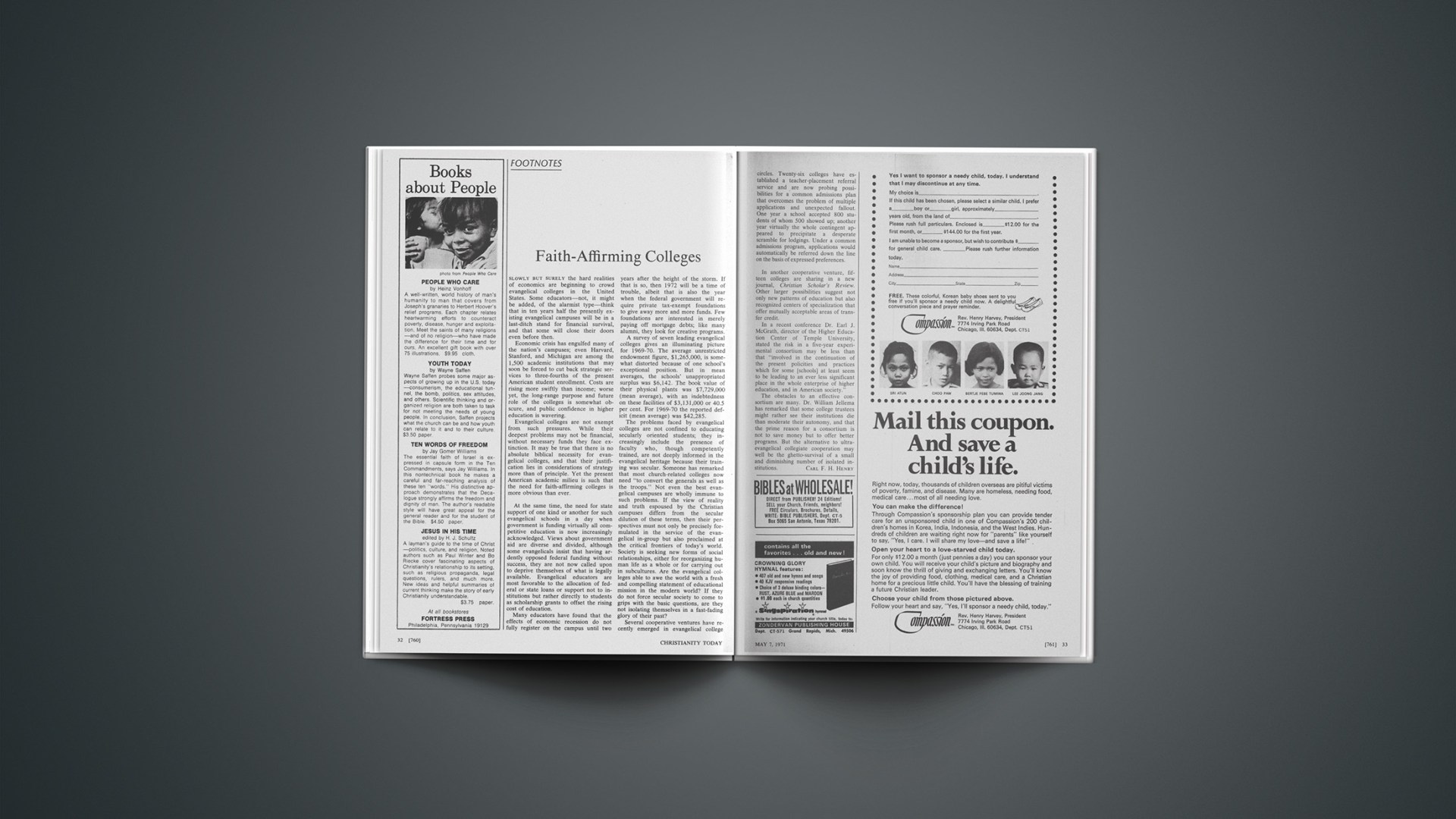Slowly but surely the hard realities of economics are beginning to crowd evangelical colleges in the United States. Some educators—not, it might be added, of the alarmist type—think that in ten years half the presently existing evangelical campuses will be in a last-ditch stand for financial survival, and that some will close their doors even before then.
Economic crisis has engulfed many of the nation’s campuses; even Harvard, Stanford, and Michigan are among the 1,500 academic institutions that may soon be forced to cut back strategic services to three-fourths of the present American student enrollment. Costs are rising more swiftly than income; worse yet, the long-range purpose and future role of the colleges is somewhat obscure, and public confidence in higher education is wavering.
Evangelical colleges are not exempt from such pressures. While their deepest problems may not be financial, without necessary funds they face extinction. It may be true that there is no absolute biblical necessity for evangelical colleges, and that their justification lies in considerations of strategy more than of principle. Yet the present American academic milieu is such that the need for faith-affirming colleges is more obvious than ever.
At the same time, the need for state support of one kind or another for such evangelical schools in a day when government is funding virtually all competitive education is now increasingly acknowledged. Views about government aid are diverse and divided, although some evangelicals insist that having ardently opposed federal funding without success, they are not now called upon to deprive themselves of what is legally available. Evangelical educators are most favorable to the allocation of federal or state loans or support not to institutions but rather directly to students as scholarship grants to offset the rising cost of education.
Many educators have found that the effects of economic recession do not fully register on the campus until two years after the height of the storm. If that is so, then 1972 will be a time of trouble, albeit that is also the year when the federal government will require private tax-exempt foundations to give away more and more funds. Few foundations are interested in merely paying off mortgage debts; like many alumni, they look for creative programs.
A survey of seven leading evangelical colleges gives an illuminating picture for 1969–70. The average unrestricted endowment figure, $1,265,000, is somewhat distorted because of one school’s exceptional position. But in mean averages, the schools’ unappropriated surplus was $6,142. The book value of their physical plants was $7,729,000 (mean average), with an indebtedness on these facilities of $3,131,000 or 40.5 per cent. For 1969–70 the reported deficit (mean average) was $42,285.
The problems faced by evangelical colleges are not confined to educating secularly oriented students; they increasingly include the presence of faculty who, though competently trained, are not deeply informed in the evangelical heritage because their training was secular. Someone has remarked that most church-related colleges now need “to convert the generals as well as the troops.” Not even the best evangelical campuses are wholly immune to such problems. If the view of reality and truth espoused by the Christian campuses differs from the secular dilution of these terms, then their perspectives must not only be precisely formulated in the service of the evangelical in-group but also proclaimed at the critical frontiers of today’s world. Society is seeking new forms of social relationships, either for reorganizing human life as a whole or for carrying out in subcultures. Are the evangelical colleges able to awe the world with a fresh and compelling statement of educational mission in the modern world? If they do not force secular society to come to grips with the basic questions, are they not isolating themselves in a fast-fading glory of their past?
Several cooperative ventures have recently emerged in evangelical college circles. Twenty-six colleges have established a teacher-placement referral service and are now probing possibilities for a common admissions plan that overcomes the problem of multiple applications and unexpected fallout. One year a school accepted 800 students of whom 500 showed up; another year virtually the whole contingent appeared to precipitate a desperate scramble for lodgings. Under a common admissions program, applications would automatically be referred down the line on the basis of expressed preferences.
In another cooperative venture, fifteen colleges are sharing in a new journal, Christian Scholar’s Review. Other larger possibilities suggest not only new patterns of education but also recognized centers of specialization that offer mutually acceptable areas of transfer credit.
In a recent conference Dr. Earl J. McGrath, director of the Higher Education Center of Temple University, stated the risk in a five-year experimental consortium may be less than that “involved in the continuation of the present policities and practices which for some [schools] at least seem to be leading to an ever less significant place in the whole enterprise of higher education, and in American society.”
The obstacles to an effective consortium are many. Dr. William Jellema has remarked that some college trustees might rather see their institutions die than moderate their autonomy, and that the prime reason for a consortium is not to save money but to offer better programs. But the alternative to ultraevangelical collegiate cooperation may well be the ghetto-survival of a small and diminishing number of isolated institutions.










